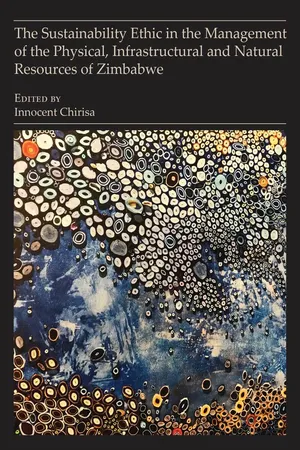
The Sustainability Ethic in the Management of the Physical, Infrastructural and Natural Resources of Zimbabwe
- 500 pages
- French
- PDF
- Disponible sur iOS et Android
The Sustainability Ethic in the Management of the Physical, Infrastructural and Natural Resources of Zimbabwe
À propos de ce livre
Humanity has extensively exploited natural and physical resources, since the Industrial Revolution in Europe. A geological era, now called the Anthropocene, has been coined in environmental and developmental circles, to mark the increased domination of humanity on Earth and its resources. Today, the ecological footprint on the fragile planet continues to increase. Mass industrialisation, like what China is doing and pushing for, is one of the drivers for increased urbanisation that results in increased demand for land. It is also the stimulus behind increased deforestation, overfishing, and pollution. As the fragility of the Earth increases, global bodies like the Intergovernmental Panel on Climate Change are pushing to reduce the Earths temperature. Human efforts to manage the problem cascade from a global to a regional, to a national, as well as to much localised scales. Missing though are nuanced contributions at national and community levels, which this book is an attempt to bridge. The nagging sense of responsibility is what this book explores under the label of sustainability ethic. As a case study, the book examines the use of sustainability ethic in the management of the physical, infrastructural and natural resources of Zimbabwe. This ethic is built on pillars that include participation of people (households) in their pursuit for sustainable livelihoods, appropriate technology, tools and techniques for environmental protection. It also hinges on stewardship and structures, institutions, policies and processes of governance and sustainability. There are also the aspects of ethics, laws and indigenous technical knowledge for sustainability, capacity building and education plans and programmes for sustainability and population and demographic determinants, processes and outcomes for sustainability. The book is a timely contribution to an urgent global concern and climate change debate.
Foire aux questions
Informations
Table des matières
- Cover
- Title page
- Copyright page
- Note on Contributors
- Contents
- Chapter 1 - Sustainability: An Overview
- Chapter 2 - Emerging Settlement Planning and Development Paradigms with Reference to Zimbabwe
- Chapter 3 - Ecological Footprint Analysis for Gletwyn, Chishawasha Hills, Harare
- Chapter 4 - Shifting Physical Boundaries and Implications for Harare since 1890
- Chapter 5 - Prospects for a Sustainable Rail Commuting System in Harare
- Chapter 6 - Diagnosing the 2014 Flood Disaster of Tokwe-Mukosi in Search of Sustainable Solutions
- Chapter 7 - Rationality, Sustainability and the Planning of Human Settlements in Zimbabwe
- Chapter 8 - Parameters of Land-use Densification in Urban Zimbabwe: Lessons from Harare City
- Chapter 9 - Infrastructure Maintenance for Sustainable Agriculture in Zimbabwe
- Chapter 10 - The Question of Sustainability and Dumpsites in Harare: A Case Study of Pomona
- Chapter 11 - The Newlands Market in Harare: An Ecological Footprint Analysis of Forest Resources and Products
- Chapter 12 - The Central Africa Building Society Project in Budiriro, Harare: The Cost of Low-cost Housing?
- Chapter 13 - Public Sanitation Service Delivery in Harare Central Business District
- Chapter 14 - Groundwater Management in Greater Harare, Zimbabwe
- Chapter 15 - Smallholder Farmers’ Adaptive Capacity to Climate Change and Variability in Zimbabwe
- Chapter 16 - Wetlands under the Impact of Urban Development in Zimbabwe
- Chapter 17 - Smart City Development as an Aspect of the Real Estate Advancement: Evidence from Harare
- Chapter 18 - Greening the Construction Industry in Zimbabwe
- Chapter 19 - The Case for National Database towards Sustainable Property Management in Zimbabwe
- Chapter 20 - Rubber from Euphorbia Matebelensis Latex
- Chapter 21 - The Sustainability of Diamond Mining in Zimbabwe
- Chapter 22 - Indigenous Knowledge in Beekeeping and Education for Sustainable Development in Zimbabwe
- Chapter 23 - The Green Economy Potential in Zimbabwe
- Back cover